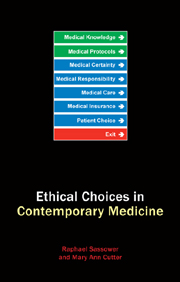4 - A new ethics of medical practice
Summary
As we survey some of the epistemological issues raised in medicine, we come to realize that they arise out of specific cultural concerns (social, economic and political) and have the power to transform them. An excellent example is the outcome of the Nuremberg Trials after the Second World War with regard to medical experimentation without informed consent. Institutional review boards became mandatory in the USA and Europe because of this reexamination and as such demonstrate how the ethical dimensions of contemporary western culture must be viewed against the backdrop of debates about scientific knowledge acquisition and application. Put another way, bioethics depends much on philosophical reflection and the kind of self-conscious feedback loops that inform future behaviour. Given this, it is time to rethink our approaches in bioethics, thereby fostering a new ethics of medical practice. One of the conclusions we draw is that as medicine is a context-bound discipline, so is bioethics. This insight leads us to argue that any account of bioethics that sets itself forth as the definitive methodology to use in the health care setting is questionable. Bioethical discourses are themselves evolving bodies of knowledge and values, which are set within particular historical, cultural contexts. They are integrative – within time, settings and lives – thus leading us to offer our suggestions for medical practice using an “integrative bioethics”.
The plurality of medical knowledge
In order to contextualize our own proposals with regard to what should be done in the bioethical domain, a domain we acknowledged is understudied from the perspective of its epistemological foundation, we would like to rehearse some ideas and issues related to the complexity of biology in general and medicine in particular.
- Type
- Chapter
- Information
- Ethical Choices in Contemporary MedicineIntegrative Bioethics, pp. 104 - 138Publisher: Acumen PublishingPrint publication year: 2007

